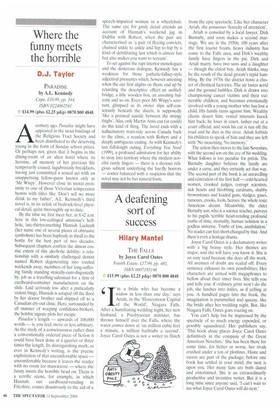A deafening sort of success
Hilary Mantel
THE FALLS by Joyce Carol Oates Fourth Estate, £17.99, pp. 481, ISBN 0007185146 e 115.99 (plus £2.25 p&p) 0870 800 4848
1 ‘ 'm a bride who has become a widow in less than one day,' says Ariah, in the 'Honeymoon Capital of the World', Niagara Falls.
After a humiliating wedding night, her new husband, a Presbyterian minister, has thrown himself over the Falls, where the water comes down at 'six million cubic feet a minute, a million bathtubs a second'. Joyce Carol Oates is not a writer to flinch from the epic spectacle. Like her character Ariah, she possesses 'ferocity of attention'.
Ariah is consoled by a local lawyer, Dirk Burnaby, and soon makes a second marriage. We are in the 1950s; 100 years after the first tourist boom, heavy industry has come to the Falls area, and Dirk's wealthy family have fingers in the pie. Dirk and Ariah marry, have two sons and a daughter — though the eldest boy, Ariah thinks, may be the result of the dead groom's tepid fumbling. By the 1970s the district hosts a cluster of chemical factories. The air tastes acrid and the ground bubbles. Dirk is drawn into championing cancer victims and their vulnerable children, and becomes emotionally involved with a young mother who has lost a child. His family turns against him. Wealthy clients desert him: vested interests knock him back; he loses in court, lashes out at a court official, and soon his car is run off the road and he dies in the river. Ariah forbids his children to speak of him and they are left with 'No mourning. No memory.'
The action then moves to the late Seventies, with the second son on the eve of his wedding. What follows is too peculiar for précis. The Burnaby daughter believes the family are under a curse, and they certainly act that way. The second part of the book is an unravelling and reiteration of the first half— cold-hearted women, crooked judges, corrupt scientists, sick hearts and throbbing eardrums, shabby brownstones and loaded guns, sludges, gases, tumours, crooks, fools, heroes: the whole toxic American dream. Meanwhile, the elder Burnaby son, who is a science teacher, purveys to his pupils 'terrible heart-rending profound truths of time, mortality, human isolation in a godless universe. Truths of loss, annihilation.' No reader can feel short-changed by that. And there's even a hostage drama.
Joyce Carol Oates is a declamatory writer with a big brassy style. Her themes are major, and she will have you know it. She is an easy read because she does all the work. All avenues of doubt are sealed off. Every sentence exhausts its own possibilities. Her characters are armed with megaphones to bellow about their inner lives. She tells you and tells you: if ordinary print won't do the job, she lurches into italics, as if yelling at you. A hundred pages into the book, the imagination is pummelled and queasy, like the bride after her wedding night. But, like Niagara Falls, Oates goes roaring on.
You can't help but be impressed by the spectacle of so much energy expended, or possibly squandered. Her publishers say, 'This book alone places Joyce Carol Oates definitively in the company of the Great American Novelists.' She has been there for some time, for better or worse, her rivals crushed under a ton of plotlines. Haste and excess are part of the package; before one book has settled in your mind, the next is upon you. Her many fans are both dazed and entertained. She is an extraordinarily productive and inventive writer. But it is a long time since anyone said, 'I can't wait to see what Joyce Carol Oates will do next.'










































































 Previous page
Previous page